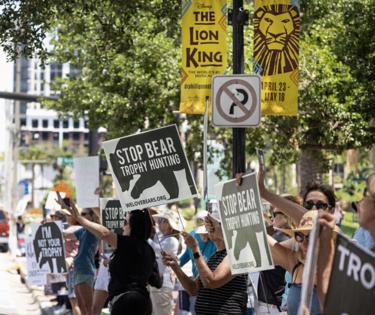Florida spares some bears, drops 'harvest' quota for upcoming hunt
Published in News & Features
Amid a surge of applications for Florida’s first bear hunt in a decade, the state is reducing the number of black bears that can be taken in the controversial December event.
State wildlife authorities this week cut the number of available bear tags by 15, to 172. Each tag, distributed through an application process that opened last Friday, entitles a hunter to kill one bear.
“That’s going in the right direction,” said Chuck O’Neal, president and founder of of Speak Up Wekiva, a Central Florida-based environmental group which opposes hunting the iconic and often reclusive bear, the state’s largest land mammal. “Better…but still too many.”
George Warthen, chief conservation officer for the Florida Fish & Wildlife Conservation Commission, told the Orlando Sentinel that the agency had received 82,787 applications to enter the bear-permit lottery through the end of the day Wednesday.
Nevertheless, he said, FWC trimmed the suggested “harvest” or kill quota from 187 bears because of increased concerns about “other known mortality” factors exclusively in the north hunting zone, an area south of the Georgia state line and west of Jacksonville.
Harvest quotas are unchanged in Florida’s other bear-hunting zones.
That includes Central Florida which boasts the state’s largest subpopulation of bears, about 1,200.
The harvest quota for the Central Bear Management Unit is just 18 because of the most significant mortality factor: motor vehicles. About 140 bears are killed yearly crossing roads within the Central Unit, which includes Lake, Orange, Seminole and Volusia counties.
The state envisions an annual hunt in which new kill quotas will be set for each unit each year.
Some wildlife advocates and leaders of conservation groups worried state Fish & Wildlife authorities might boost the number of available permits in response to the effort by hunt opponents to win a permit in hopes of keeping bear tags out of the hands of hunters.
FWC has frowned on the strategy dubbed “bag a tag, spare a bear” by the state chapter of the Sierra Club.
Each lottery application costs $5 and people with a Florida hunting license may enter as often as they wish, though no one can win more than one.
The number of applications in less than a week startled Susannah Randolph, president of the Sierra Club Florida Chapter.
She said tens of thousands likely came from Floridians determined to save a bear, but she suspects as many or more are from trophy hunters.
Randolph noted supporters of Constitutional Amendment 2, the Right to Hunt and Fish on last year’s statewide ballot far outraised opponents of the measure, which won 67% of the ballots cast. The amendment enshrined as a public right in Florida’s Constitution fishing, hunting and the taking of wildlife by traditional methods.
The bear tag application window closes Monday at 11:59 p.m.
The hunt is facing a new legal challenge filed this week in circuit court in Tallahassee on behalf of Bear Warriors Unlimited. The Seminole County-based group initially sought to block the hunt through an administrative process, but has abandoned that effort in favor of seeking to persuade a judge to cancel the 23-day hunt.
Attorney Raquel Levy, representing the group, alleges FWC based its August approval on “stale facts” from a decade-old population study of black bears, once listed by the state as a threatened species.
“Over those last 10 years, Florida has been developed substantially with urban sprawl cutting deeply into bear habitat,” Levy said. “With their territories increasingly infringed upon, the black bear is threatened not just by poaching, but also many other things.”
Collisions with motor vehicles kill more than 300 bears a year statewide.
She said her client has advocated for “harmonious coexistence” of people and wildlife.
The group, led by founder Katrina Shadix, has helped to reduce conflicts between bears and people by providing hundreds of Central Florida residents with straps to lock down garbage can lids, deterring bears from foraging for food scraps in curbside trash.
Levy alleged in the lawsuit that FWC’s governing board is compromised by commissioners with development interests.
All seven commissioners were appointed or re-appointed by Gov. Ron DeSantis.
The lawsuit also contends the wildlife board impermissibly delegated “unbridled discretion” to the agency’s executive director to establish bear harvest quotas in future hunts. Levy said the commission’s abdication of authority violates the public’s due process to be heard on the issue.
The agency argued during public hearings that its proposed hunt quotas are based on science and data.
But the lawsuit claims the commission failed to establish adequate standards for determining annually the number of bear-hunting permits to issue and failed to set a methodology for determining what the agency considers a “sustainable population” of black bears.
FWC’s website says about 4,050 black bears roam the Florida peninsula, which the agency has divided into seven geographical bear-management areas. Three of those areas are estimated to have less than 200 bears, too few to hunt. FWC estimates just 30 wander the Big Bend area.
In interviews with the Sentinel, Warthen said the hunt is designed to target male bears as most sows or female bears should be in dens by December. Hunters can be more patient and selective because of the longer season and limited permits this time.
The 2015 hunt, set for a week in October, had a kill quota of 320 bears but ended after two days with 304 dead bears.
Many were females, and some were lactating mothers.
_____
©2025 Orlando Sentinel. Visit at orlandosentinel.com. Distributed by Tribune Content Agency, LLC.







Comments